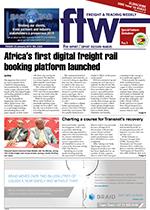The departure this week of an export container from Grindrod’s Johannesburg intermodal facility to Zambia marks a major milestone in the launch of the first digital freight rail booking platform in Africa, branded RailFOX. It’s the brainchild of EmptyTrips chief executive officer Benji Coetzee who started the company in 2017 as a road freight matching portal linking those with spare capacity on their trucks with those who need goods transported. The objective is to reduce logistics costs by addressing the wasted space often due to an empty leg. “30% of the landed tonne costs is transport,” she told FTW, “and a lot of commodities move one way which mean the truck often returns empty.” While it’s not possible to fill the entire backload, by potentially matching cargo, wastage can be avoided – and the only way to do that at scale is by using data and exponential computing. “My undergrad included mathematics and statistics, so I started writing an algorithm that uses the volumetric size to match to the space on a vehicle – be it a truck, train or in a container. It may not always be a perfect match given cargo types, but it provides intelligence and an ability for users to negotiate at scale.” This is similar to a digital broker and automates the process. Once they’ve found a match they can transact. “We do a quality check process – similar to FICA - of all carriers on the portal.” With the road portal up and running, the next step was to replicate the idea for rail. But Coetzee required expert input from an industry player to ensure a successful product. Grindrod Rail Consultancy Services (GRCS), under the leadership of Andrew Thomas, was the ideal strategic partner, according to Coetzee. GRCS, which operates freight trains on the North-South corridor between South Africa, Zimbabwe and Zambia, committed to the concept to test, enable and support it. “Unfortunately, the majority of the northbound trains run empty to Zambia to load copper or other commodities for export. While we won’t originate large volumes going into Zambia or Zimbabwe by rail initially, there is potential for the likes of Shoprite, AB InBev, Distell, Unilever, Nestle and Clover to expand their African footprint in a sustainable, secure and safer manner than by road.” "A lot of multinationals in South Africa want to expand but are reluctant to do so because the logistics is such a nightmare. Distell, for example, has never had an African growth strategy and exports largely to Europe. We want to change this opinion of Africa and rail. Even if we send two containers of brandy a month to Zambia, it will be a start.” And in Coetzee’s view, using rail is a no brainer. “The cargo is moving in a locked container on a train that won’t be hijacked. When last did you hear of a train being hijacked? Maybe in movies.” June 2017 saw the initial launch of the Rail Freight Open eXchangeTM (RailFOX) which attracted widespread industry interest. “To date, we have listed only three main stations with three to four sidings each. This will be expanded. Whatever is moving north or south can be safely stored in Grindrod’s bonded intermodal facility for further allocation.” There’s no denying that getting buy-in has been an uphill battle demanding resilience. “First we had to build demand and trust for the freight. Because of rail’s inefficiency most customers have defaulted to the convenience of road. Rail’s greatest competitive advantage is sustainability – the environmental impact, safety of the goods and social burden reduction. There is a marginal saving on cost, but this will aggregate down as demand goes up and overall round rates stabilise.” Lastly, a lot of companies shy away from rail because it’s inaccessible. “Contacting NRZ or Transnet to try to book freight with or without an account is very difficult. The entities struggle to keep up. With the portal we have found a way to significantly remove administrative bottlenecks, improving customer service to hopefully attract more longhaul freight by rail.” Coetzee is hopeful that Transnet will come on board soon, and since they operate 80% of all railway track in Africa, they could be part of a game-changing logistics solution for the continent.
CAPTION
A lot of multinationals in South Africa want to expand but are reluctant to do so because the logistics is such a nightmare. – Benji Coetzee

